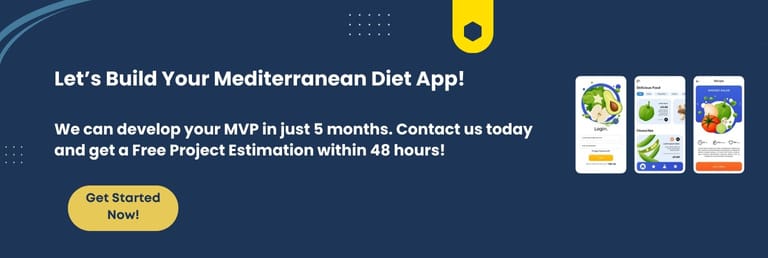Home
»Blog Insights
»How to Develop a Mediterranean Diet App: Features, Benefits, and Development Guide
How to Develop a Mediterranean Diet App: Features, Benefits, and Development Guide
Keyur Patel
September 12, 2025
15 min
The Mediterranean diet is widely regarded as one of the healthiest eating patterns in the world. With its focus on whole foods, fresh vegetables, lean proteins, and healthy fats, it has been linked to numerous health benefits, including improved heart health and weight management. Given the growing demand for health and nutrition apps, developing a Mediterranean diet app can be a lucrative and impactful venture. This comprehensive guide will walk you through the process of developing a Mediterranean Diet app, from conceptualization to launch, covering essential features, benefits, and development strategies.
What is Mediterranean Diet?
The Mediterranean diet is a heart-healthy eating pattern inspired by the traditional cuisines of countries bordering the Mediterranean Sea, such as Greece, Italy, and Spain. It emphasizes whole foods like fruits, vegetables, whole grains, nuts, and legumes, along with healthy fats from olive oil and fish. Lean proteins, such as poultry and seafood, are preferred over red meat, while dairy is consumed in moderation. The diet also encourages red wine in moderation and limits processed foods and added sugars. Known for its numerous health benefits, the Mediterranean diet is linked to lower risks of heart disease, improved brain function, and overall longevity.
Why Build a Mediterranean Diet App?
Rising Demand for Nutrition and Diet Apps
The global health and wellness industry is booming, and mobile applications that help users track their diet, manage meal plans, and achieve fitness goals are in high demand. The Mediterranean diet, known for its effectiveness and scientifically backed benefits, makes an excellent niche for a diet-focused mobile application.
Increased Awareness About Healthy Eating
More people are looking for sustainable and science-backed diets rather than fad diets. The Mediterranean diet fits this criterion, making it a great market opportunity.
Monetization Opportunities
A well-designed Mediterranean diet app can be monetized through subscriptions, in-app purchases, personalized meal plans, affiliate marketing with health food brands, and partnerships with nutritionists or fitness experts.
Key market insights:
- High demand for both free and premium app options
- Users actively searching for the “best” Mediterranean Diet apps and mediterranean diet tracker.
- Growing interest in Android-specific solutions
Benefits of the Mediterranean Diet and App Usage
Highlighting the benefits of both the Mediterranean Diet and using your app can be a powerful motivator for potential users. Here are key points to emphasize:
Health Benefits of the Mediterranean Diet
- Heart Health: Studies show a significant reduction in the risk of heart disease and stroke.
- Weight Management: The diet promotes sustainable weight loss and maintenance.
- Cognitive Function: Associated with a lower risk of cognitive decline and Alzheimer’s disease.
- Diabetes Prevention: Can help prevent type 2 diabetes and improve glycemic control.
- Longevity: Linked to increased lifespan and healthier aging.
How the App Facilitates Adherence
- Simplified Meal Planning: Takes the guesswork out of following the diet correctly.
- Consistent Tracking: Helps users stay accountable and monitor their progress.
- Educational Support: Provides ongoing learning about the diet and its benefits.
- Motivation and Community: Offers encouragement and support through community features.
- Convenience: Makes shopping and meal preparation easier with integrated tools.
By clearly communicating these benefits, you’ll not only attract users but also help them understand the value your app brings to their health journey.
Key Features for a Successful Mediterranean Diet App
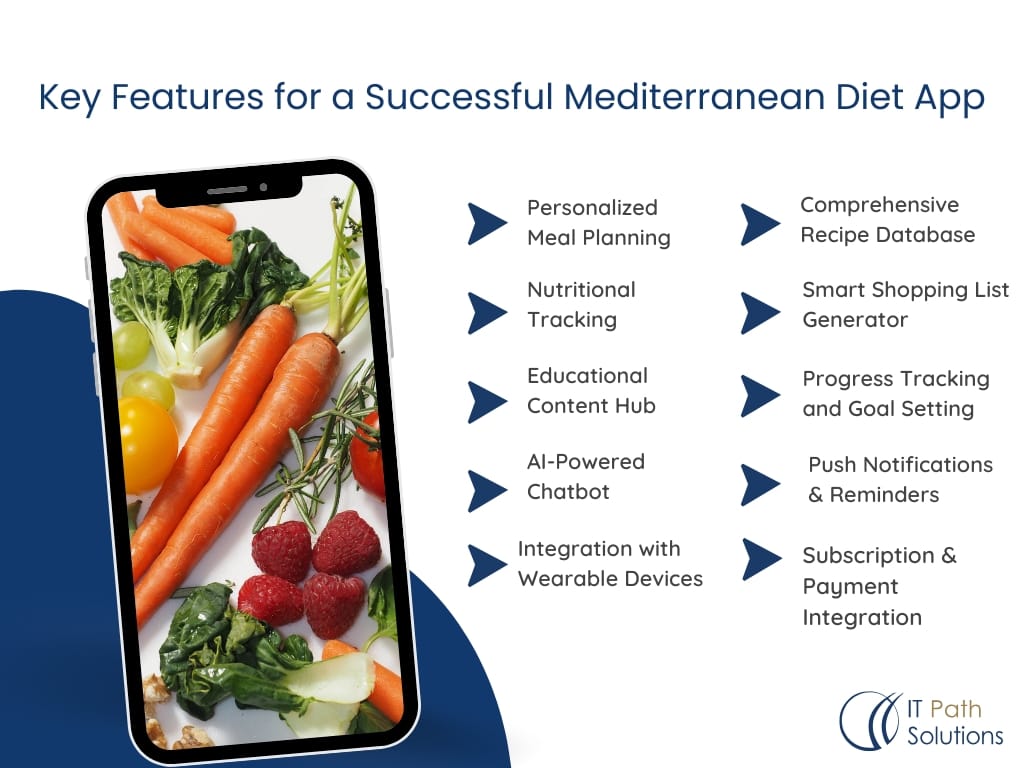
To create a compelling Mediterranean Diet app, consider incorporating these essential features:
Personalized Meal Planning
- Develop an algorithm that generates customized diet plans based on user preferences, dietary restrictions, and nutritional goals.
- Include options for different calorie levels and Mediterranean Diet variations (e.g., pescatarian, vegetarian).
Comprehensive Recipe Database
- Curate a diverse collection of authentic Mediterranean recipes.
- Include high-quality images, step-by-step instructions, and nutritional information for each recipe.
- Implement a robust search and filtering system to help users find recipes quickly.
Nutritional Tracking and Analysis
- Create a user-friendly food logging system with a barcode scanner for quick entry.
- Provide detailed nutritional breakdowns, including macronutrients and micronutrients.
- Offer visual representations of nutritional data through charts and graphs.
Smart Shopping List Generator
- Automatically generate shopping lists based on meal plans and recipes.
- Allow users to customize and edit lists easily.
- Implement a feature to save favorite items or frequently purchased products.
Educational Content Hub
- Develop a section dedicated to explaining the principles of the Mediterranean Diet.
- Include articles, videos, and infographics on the health benefits and lifestyle aspects.
- Regularly update content to keep users engaged and informed.
Progress Tracking and Goal Setting
- Implement a system for users to set personalized health and dietary goals.
- Provide visual progress trackers and milestone celebrations.
- Offer insights and suggestions based on user progress.
AI-Powered Chatbot for Diet Guidance
- An AI-based chatbot to answer diet-related queries and suggest alternative meals.
Community Support and Sharing Features
- Create a platform for users to connect, share experiences, and support each other.
- Integration with social media platforms to share meal updates.
- Implement a recipe sharing feature where users can contribute their own Mediterranean-inspired creations.
- Develop challenges or group activities to foster engagement and motivation.
Push Notifications & Reminders
- Timely reminders for meal prep, water intake, grocery shopping, and tracking progress.
Integration with Wearable Health Devices
- Incorporate APIs to sync with popular Wearable fitness trackers and smart scales.
- Use this data to provide more accurate nutritional recommendations and progress tracking.
Subscription & Payment Integration
- Free and premium plans with exclusive recipes, meal plans, and consultations.
- Secure payment gateway integration for in-app purchases.
By focusing on these features, you’ll create a comprehensive tool that not only guides users through the Mediterranean Diet but also enhances their overall health journey.
Also Read :- Detailed Guide to Developing a Fitness App
Comprehensive Development Guide
Developing a successful Mediterranean Diet app requires careful planning and execution. Here’s a step-by-step guide to help you navigate the process:
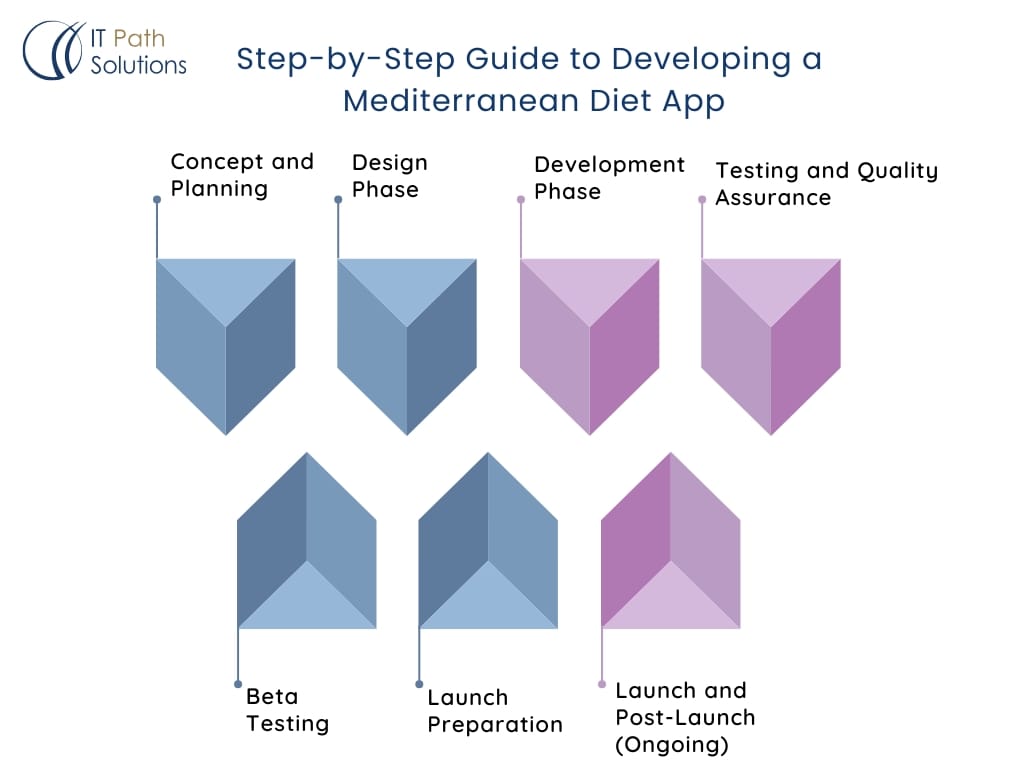
Concept and Planning (2-4 weeks)
- Define your app’s unique value proposition.
- Conduct thorough market research and competitor analysis.
- Create a detailed project plan and timeline.
- Assemble your development team.
Design Phase (4-6 weeks)
- Develop user personas and user journey maps.
- Create wireframes and mockups for all app screens.
- Design a visually appealing and intuitive user interface.
- Conduct user testing on design prototypes and iterate based on feedback.
Development Phase (12-16 weeks)
- Set up the development environment and version control.
- Develop the backend infrastructure, including databases and APIs.
- Implement core features such as meal planning, recipe database, and nutritional tracking.
- Integrate third-party services for additional functionality (e.g., barcode scanning, health device syncing).
- Conduct regular code reviews and maintain coding standards.
Testing and Quality Assurance (4-6 weeks)
- Perform thorough testing, including unit tests, integration tests, and user acceptance testing.
- Conduct performance testing to ensure the app runs smoothly under various conditions.
- Address and fix any bugs or issues identified during testing.
- Optimize app performance and reduce load times.
Beta Testing (2-4 weeks)
- Release a beta version to a select group of users.
- Gather feedback on user experience, features, and overall satisfaction.
- Implement necessary changes based on beta tester feedback.
Launch Preparation (2-3 weeks)
- Finalize app store listings, including descriptions, screenshots, and promotional materials.
- Set up analytics tools to track app performance and user behavior.
- Prepare customer support channels and documentation.
Launch and Post-Launch (Ongoing)
- Submit the app to app stores for approval.
- Implement a marketing strategy to promote the app’s launch.
- Monitor app performance and user feedback closely.
- Plan for regular updates and feature enhancements based on user data and market trends.
By following this guide, you’ll ensure a structured approach to developing your Mediterranean Diet app, increasing the chances of a successful launch and user adoption.
User Interface Design Considerations
Creating an intuitive and engaging user interface is crucial for the success of your Mediterranean Diet app. Here are some key considerations:
Accessibility-First Design
- Implement enlarged text options to cater to users with visual impairments.
- Use high-contrast color schemes to improve readability.
- Ensure all interactive elements are easily tappable and spaced appropriately.
Simplified Navigation
- Create a clear, logical menu structure that allows users to access key features quickly.
- Use familiar icons and labels to represent different sections of the app.
- Implement a search function that works across all app content.
Visual Appeal
- Use a color palette inspired by Mediterranean aesthetics (e.g., blues, whites, earthy tones).
- Incorporate high-quality food photography to make recipes and meal plans more appealing.
- Use consistent design elements throughout the app to create a cohesive look and feel.
Personalization
- Allow users to customize their dashboard with their most-used features.
- Implement a system for saving favorite recipes and meal plans.
- Provide personalized recommendations based on user preferences and behavior.
Progress Visualization
- Create visually appealing charts and graphs to display nutritional data and progress.
- Use animations sparingly to celebrate achievements and milestones.
Intuitive Data Entry
- Design an easy-to-use food logging interface with quick-add options for common foods.
- Implement a barcode scanner for packaged foods to simplify data entry.
Responsive Design
- Ensure the app layout adapts seamlessly to different screen sizes and orientations.
- Optimize touch targets and gestures for both phone and tablet use.
By focusing on these design considerations, you’ll create an app that not only looks great but also provides a smooth and enjoyable user experience.
Technology Stack and Technical Considerations
Choosing the right technology stack is crucial for developing a robust and scalable Mediterranean Diet app. Here’s a recommended stack and key technical considerations:
Recommended Technology Stack
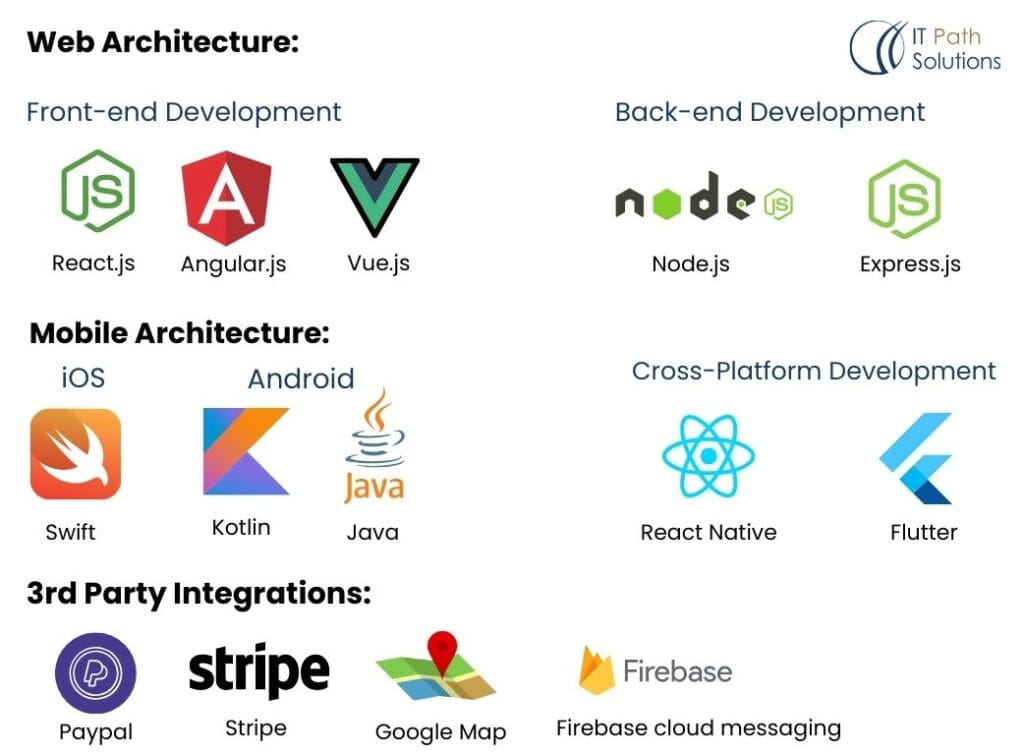
Frontend Development
- React Native for cross-platform mobile development
- Redux for state management
- Styled Components for consistent styling
Backend Development
- Node.js with Express.js for API development
- MongoDB for flexible data storage
- GraphQL for efficient data querying
Cloud Services
- AWS or Google Cloud Platform for scalable hosting
- Firebase for real-time database and authentication
Additional Tools
- Elasticsearch for powerful recipe and food item search
- TensorFlow Lite for on-device machine learning (e.g., image recognition for food logging)
Key Technical Considerations
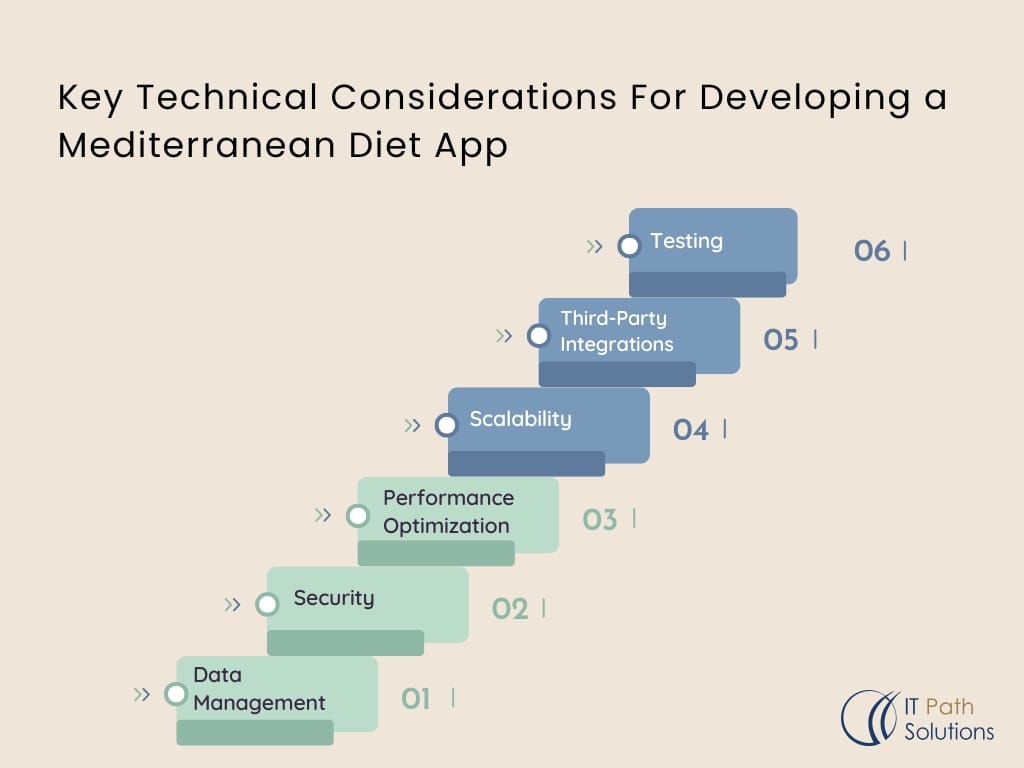
Data Management
- Implement a robust caching strategy to reduce API calls and improve app performance.
- Use efficient data structures for storing and retrieving nutritional information.
- Implement data synchronization for offline functionality.
Security
- Use HTTPS for all network communications.
- Implement proper authentication and authorization mechanisms.
- Encrypt sensitive user data, especially health-related information.
Performance Optimization
- Implement lazy loading for images and content to reduce initial load times.
- Use background tasks for data syncing and heavy computations.
- Optimize database queries for faster data retrieval.
Scalability
- Design a microservices architecture to allow for easy scaling of individual components.
- Implement load balancing to handle increased user traffic.
- Use content delivery networks (CDNs) for faster global content delivery.
Third-Party Integrations
- Develop a flexible API integration layer for connecting with various health devices and services.
- Implement webhook systems for real-time data updates from external sources.
Testing and Quality Assurance
- Set up automated testing pipelines for continuous integration and deployment.
- Implement unit tests, integration tests, and end-to-end tests to ensure app reliability.
- Use beta testing programs to gather real-world usage data and feedback.
By carefully considering these technical aspects, you’ll build a solid foundation for your Mediterranean Diet app that can scale and evolve with user needs and market demands.
Marketing Strategies
To ensure the success of your Mediterranean Diet app, implement a comprehensive marketing strategy that leverages various channels and techniques. Here’s a detailed plan to effectively promote your app:
App Store Optimization (ASO)
- Optimize your app title and description with high-volume keywords like “mediterranean diet app” (1,870 monthly searches) and “best mediterranean diet app” (480 monthly searches).
- Create compelling screenshots and app preview videos that showcase key features.
- Encourage satisfied users to leave positive reviews and ratings.
Content Marketing
- Develop a blog focused on Mediterranean Diet tips, recipes, and health benefits.
- Create long-form content around topics like “mediterranean diet app review” (50 monthly searches) to attract organic traffic.
- Produce video content for YouTube, showcasing app features and Mediterranean Diet recipes.
Social Media Marketing
- Maintain active profiles on Instagram, Facebook, and Pinterest, sharing visually appealing Mediterranean Diet content.
- Use hashtags like #MediterraneanDiet, #HealthyEating, and #MealPlanning to increase visibility.
- Run targeted ad campaigns on social platforms to reach potential users interested in healthy eating and lifestyle apps.
Influencer Partnerships
- Collaborate with health and wellness influencers to showcase your app to their followers.
- Offer exclusive discounts or features for influencers’ audiences to track campaign effectiveness.
Email Marketing
- Build an email list through blog subscriptions and app signups.
- Send regular newsletters with Mediterranean Diet tips, new recipes, and app feature highlights.
- Implement a referral program, encouraging users to invite friends for mutual benefits.
Paid Advertising
- Run Google Ads campaigns targeting keywords like “free mediterranean diet app” (170 monthly searches) to capture users looking for accessible options.
- Use retargeting ads to re-engage users who have shown interest but haven’t downloaded the app.
PR and Media Outreach
- Reach out to health and technology journalists to secure app reviews and feature articles.
- Submit your app for relevant awards and “Best of” lists in the health and fitness category.
Partnerships and Integrations
- Partner with Mediterranean restaurants or food brands for cross-promotions.
- Integrate with popular health and fitness apps to expand your user base.
Community Building
- Create a Facebook group or forum for app users to share experiences and tips.
- Host virtual events like cooking classes or Q&A sessions with nutritionists to engage your community.
Local Marketing
- Participate in health and wellness expos or food festivals to showcase your app.
- Offer workshops at local community centers or gyms on adopting a Mediterranean Diet lifestyle.
By implementing these diverse marketing strategies, you’ll increase visibility, attract new users, and foster a loyal community around your Mediterranean Diet app. Remember to track the performance of each strategy and adjust your efforts based on the data to maximize your marketing ROI.
Overcoming Development Challenges
Developing a Mediterranean Diet app comes with its unique set of challenges. Here’s how to address some of the most common obstacles:
- Ensuring Nutritional Data Accuracy
- Challenge: Maintaining an up-to-date and accurate database of nutritional information.
- Solution:
- Partner with reputable nutritional databases or APIs (e.g., USDA FoodData Central).
- Implement a system for regular data updates and verification.
- Allow users to submit corrections or additions, with a review process in place.
- Creating an Intuitive Meal Planning Algorithm
- Challenge: Developing an algorithm that generates varied, balanced, and personalized meal plans.
- Solution:
- Collaborate with nutritionists to define clear rules and guidelines for meal composition.
- Implement machine learning algorithms to improve recommendations based on user feedback and preferences.
- Allow for manual adjustments to accommodate user preferences and dietary restrictions.
- Balancing Feature Richness with App Performance
- Challenge: Adding comprehensive features without compromising app speed and responsiveness.
- Solution:
- Implement lazy loading techniques to load content as needed.
- Use efficient data structures and indexing for faster data retrieval.
- Optimize images and media content for mobile devices.
- Conduct regular performance audits and optimize bottlenecks.
- Adhering to Health Data Privacy Regulations
- Challenge: Ensuring compliance with regulations like HIPAA, GDPR, and CCPA.
- Solution:
- Implement robust data encryption for both stored and transmitted data.
- Provide clear privacy policies and obtain explicit user consent for data collection and usage.
- Regularly audit data handling practices and update security measures.
- Consider partnering with a legal expert specializing in health app compliance.
- Handling Diverse Dietary Preferences and Restrictions
- Challenge: Accommodating various dietary needs within the Mediterranean Diet framework.
- Solution:
- Implement a flexible tagging system for recipes and ingredients.
- Allow users to set detailed dietary preferences and restrictions in their profiles.
- Develop an algorithm that can substitute ingredients based on user preferences.
- Encouraging Consistent User Engagement
- Challenge: Maintaining user interest and preventing app abandonment.
- Solution:
- Implement gamification elements, such as streaks, badges, and challenges.
- Send personalized push notifications with meal suggestions and health tips.
- Regularly update content, including seasonal recipes and new features.
- Create a community aspect where users can share achievements and support each other.
- Scaling Infrastructure with User Growth
- Challenge: Ensuring the app can handle increased load as the user base grows.
- Solution:
- Design a scalable architecture from the start, using microservices where appropriate.
- Implement auto-scaling solutions for cloud infrastructure.
- Use caching strategies to reduce database load.
- Regularly conduct load testing and optimize based on results.
- Providing Accurate Recipe Conversions
- Challenge: Offering precise ingredient measurements for different serving sizes and units.
- Solution:
- Develop a robust conversion algorithm that accounts for ingredient density and common substitutions.
- Allow users to input preferred units of measurement in their settings.
- Provide visual guides for portion sizes to complement numerical measurements.
By proactively addressing these challenges, you’ll be better prepared to develop a robust, user-friendly Mediterranean Diet app that stands out in the market. Remember, the key to overcoming these obstacles lies in thorough planning, expert collaboration, and a commitment to continuous improvement based on user feedback and technological advancements.
Conclusion
Developing a Mediterranean Diet app presents an exciting opportunity to tap into a growing market while promoting healthier lifestyles. By focusing on key features like personalized meal planning, comprehensive nutritional tracking, and community support, you can create an app that truly adds value to users’ lives.
Remember to prioritize user experience in your design, choose a scalable technology stack, and implement a diverse marketing strategy to ensure your app’s success. Address challenges proactively, and always be ready to iterate based on user feedback and market trends.
With the right approach and execution, your Mediterranean Diet app can become an indispensable tool for those looking to embrace this healthy and delicious way of eating. Good luck with your development journey!
Keyur Patel
Co-Founder
Keyur Patel is the director at IT Path Solutions, where he helps businesses develop scalable applications. With his extensive experience and visionary approach, he leads the team to create futuristic solutions. Keyur Patel has exceptional leadership skills and technical expertise in Node.js, .Net, React.js, AI/ML, and PHP frameworks. His dedication to driving digital transformation makes him an invaluable asset to the company.
Get in Touch
Search
Blog Categories
